Blog
Monday, 21 November 2022, 12:00-13:30, Bangkok Time (UTC+7)
Please register at this link and when it’s time, click here to join the meeting.
>>>>See other Asia-Pacific Stats Café Series
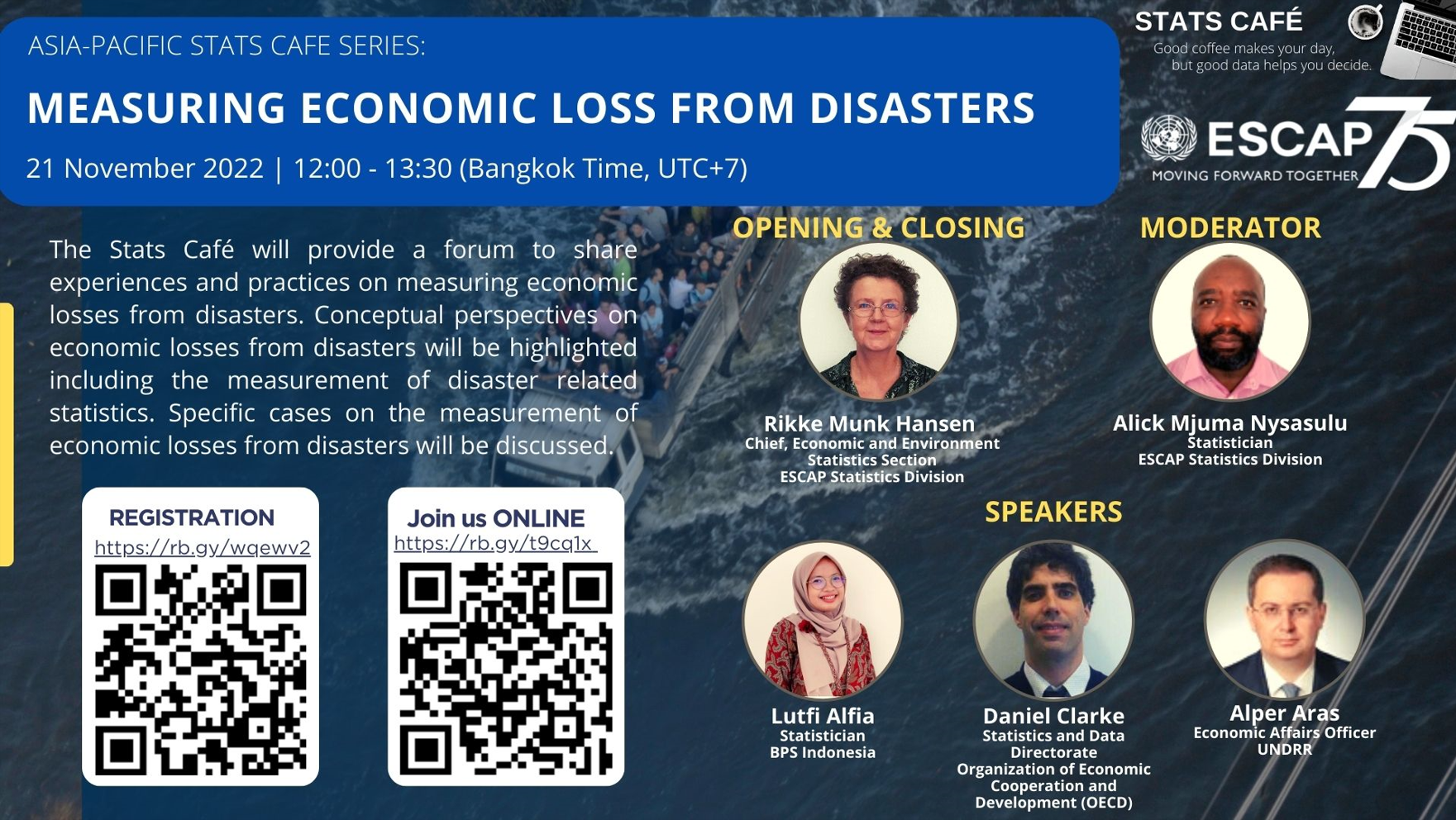
Monday, 24 October 2022, 15:00-16:00, Bangkok Time (UTC+7)
Please register at this link and when it’s time, click here to join the meeting.
>>>>See other Asia-Pacific Stats Café Series
Monday, 10 October 2022, 11:00-12:30, Bangkok Time (UTC+7)
Please register at this link and when it’s time, click here to join the meeting.
>>>>See other Asia-Pacific Stats Café Series
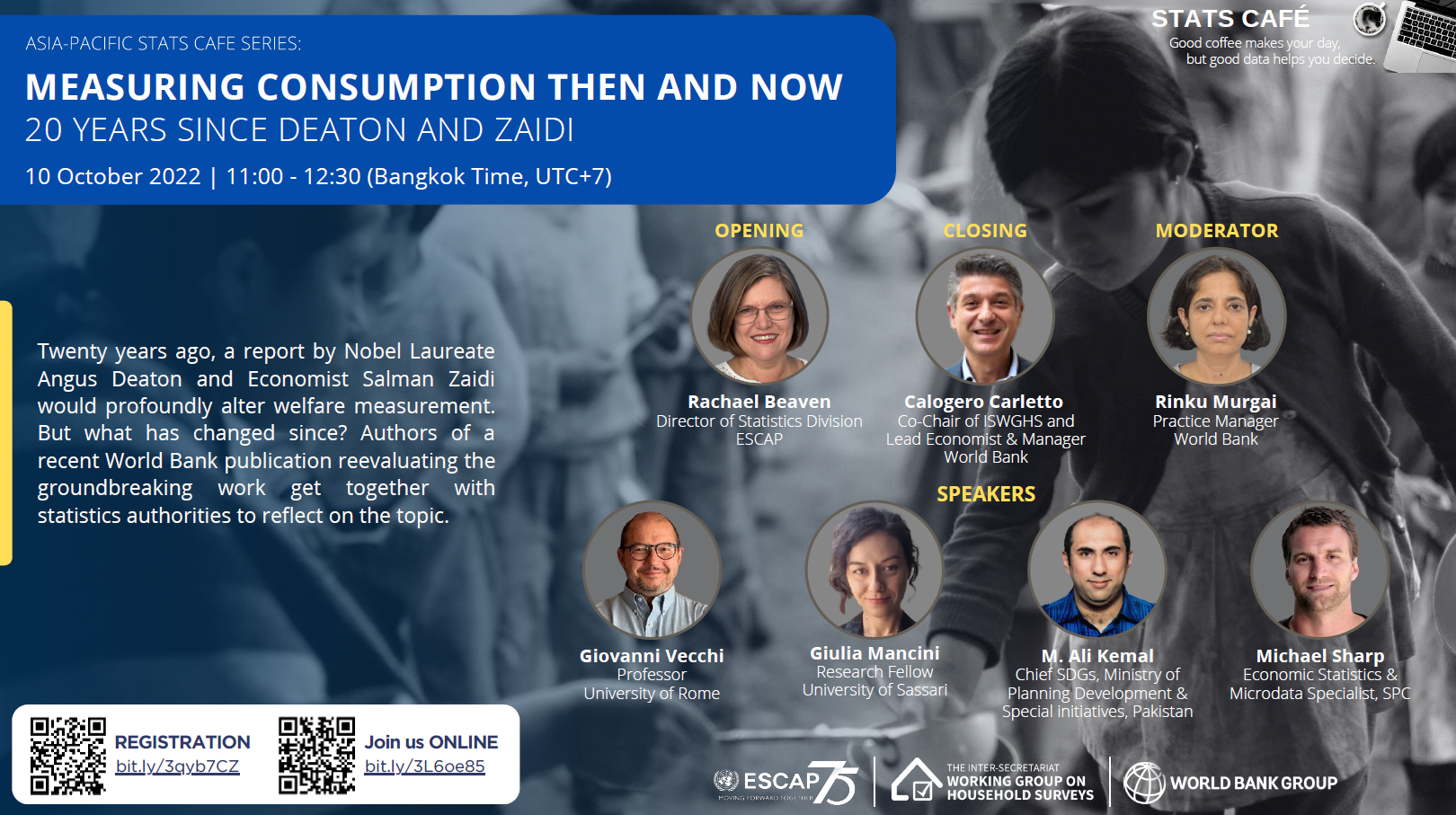
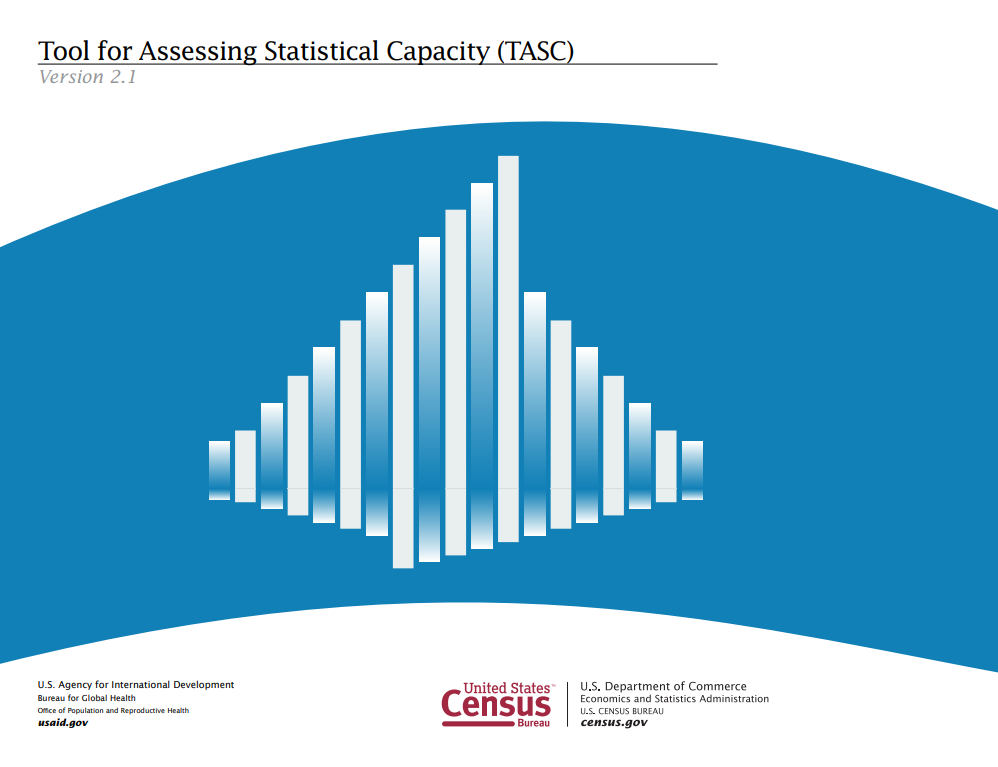
The International Programs Center of the U.S. Census Bureau releases a video explaining the Tool for Assessing Statistical Capacity (TASC). TASC provides a quantitative measure of the capacity of a National Statistical Office (NSO) to conduct Population and Housing Censuses or recurring household-based surveys. The primary objective of TASC is to measure the overall capacity of an NSO, as well as provide a breakdown of the areas of strength and weakness.
TASC results:
- aid NSOs in identifying areas where improvement is needed,
- assist NSOs and donors to justify the need for funding for training in specific areas, and
- provide a measure of the impact of capacity-building activities by being administered at two points in time, before and after.
Friday, 30 September 2022, 10:00-11:00, Bangkok Time (UTC+7).
Please register at this link and when it’s time, click here to join the meeting.
For more information, please visit https://unescap.org/events/2022/side-event-implementing-digital-identity-systems-without-leaving-anyone-behind
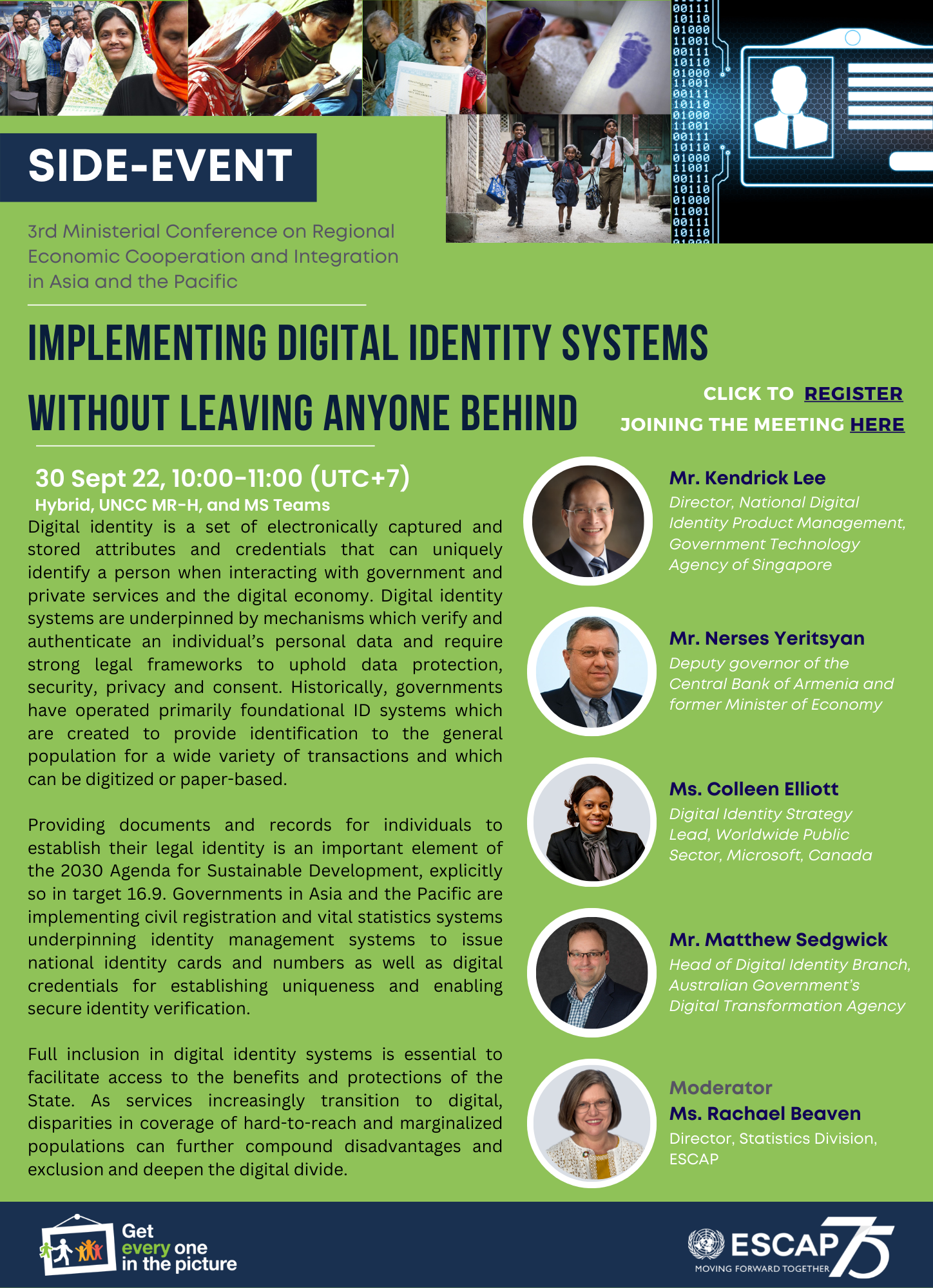
Monday, 26 September 2022, 12:00-13:30, Bangkok Time (UTC+7)
Please register at this link and when it’s time, click here to join the meeting.
>>>>See other Asia-Pacific Stats Café Series
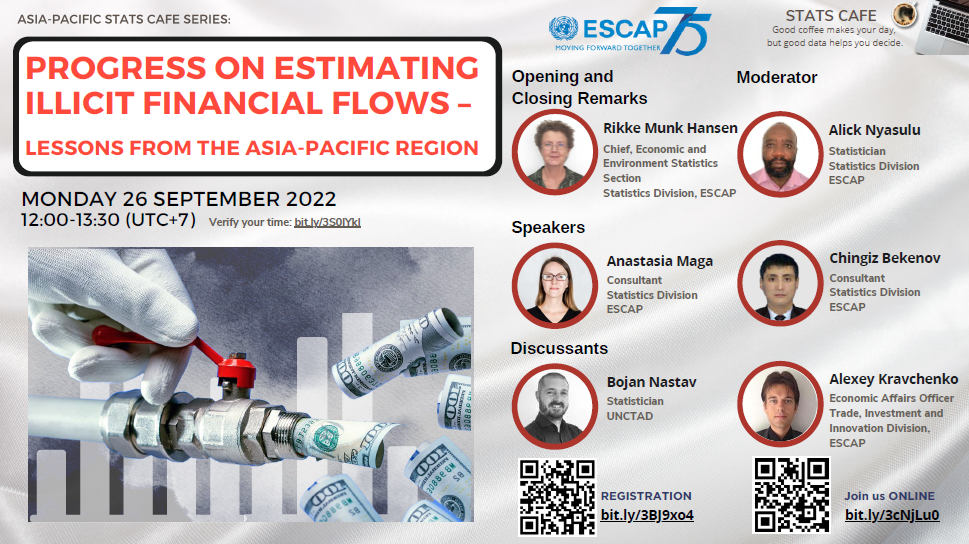
Monday, 8 August 2022, 12:00-13:45, Bangkok Time (UTC+7)
Please register at this link and when it’s time, click here to join the meeting.
For more information, please visit https://www.unescap.org/events/2022/un-escap-expert-dialogue-data-partnerships-leave-no-one-behind-ways-forward-work.
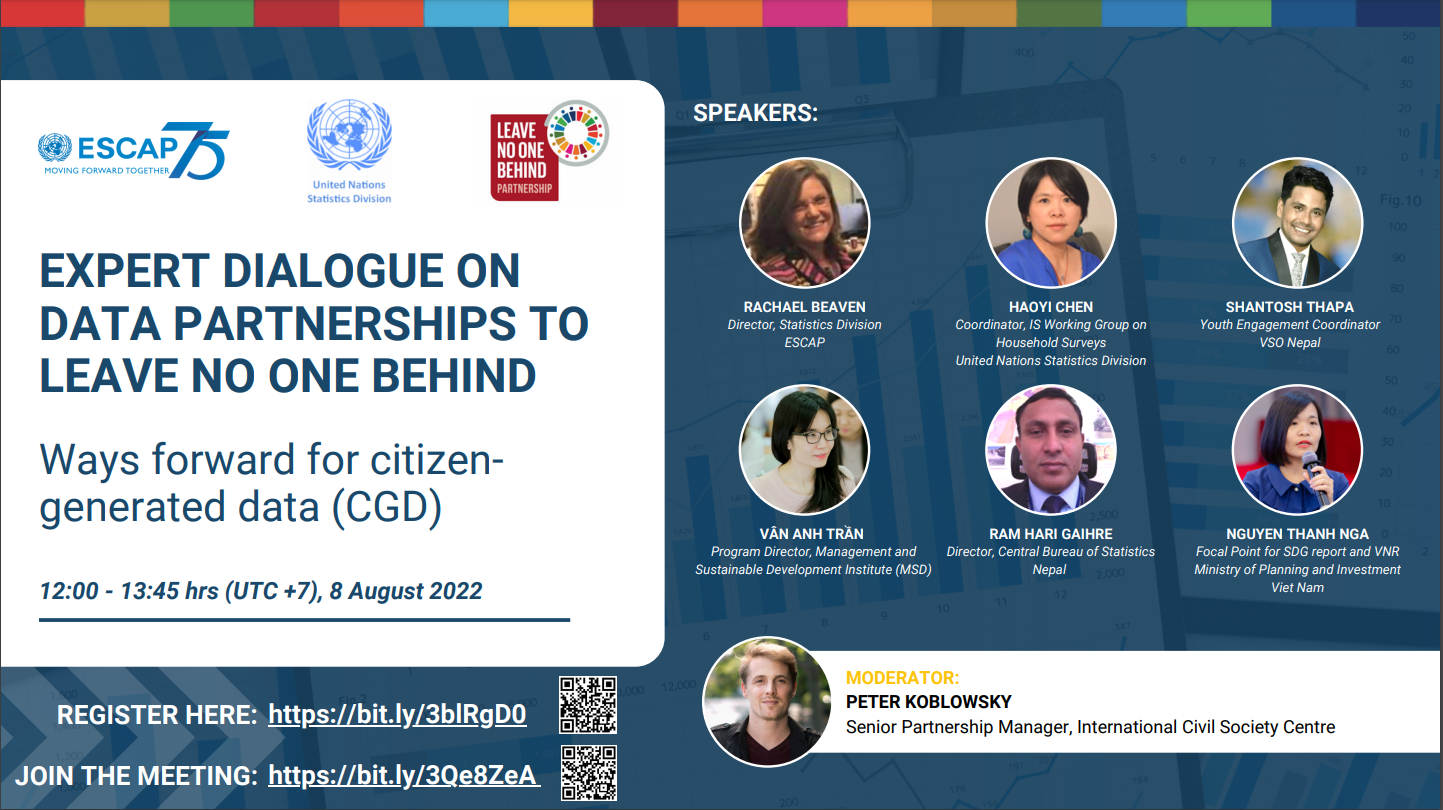
Monday, 18 July 2022, 14:00-15:00, Bangkok Time (UTC+7)
Please register at this link and when it’s time, click here to join the meeting.
>>>>See other Asia-Pacific Stats Café Series

Virtual side event at the High Level Political Forum 2022
The event takes place on Tuesday, 12 July 2022 from 7.30-9.00 am (New York time).
For more information and a registration form at this website: https://bit.ly/3ae0oci
It is co-hosted by the International Civil Society Centre and GIZ, with the support of the United Nations Statistics Division (UNSD). It will also focus on citizen-generated data (CGD) and its potential as a strategic monitoring and planning tool that can help to better reflect the situation of marginalised communities in public planning, ensuring that no one is left behind. We will present some case studies from three countries (Bangladesh, Kenya and Rwanda), followed by a panel of global experts who will discuss advantages and limitations of inclusive data like “Community-Driven Data”, sharing their perceptions on how such approaches can help to build back better after the pandemic.
The third Open House for UN PET Lab will be organized virtually on 7 July 2022 at 09.30-11.00 am (New York time).
This webinar will focus on the legal aspects of sharing data and the use of PETs. The UN PET Lab is working under the umbrella of the United Nations Statistical Commission and its focus is therefore on supporting national statistical systems. For the third event, Mr. Andrew Trask of Openmined.org will update us on the UN PET Lab and Mr. Mayank Varia of Boston University will present the work of the Legal sub-group of the Task Team on Privacy Enhancing Technologies. Furthermore, Mr. Matjaz Jug and Ms. Maria Ohoioeloen, from Statistics Netherlands, and Ms. Stephanie Straus from Georgetown University will present relevant examples.
More information and registration, scan the code above or click on this link https://unstats.un.org/bigdata/task-teams/privacy/un-pet-lab/open-house/
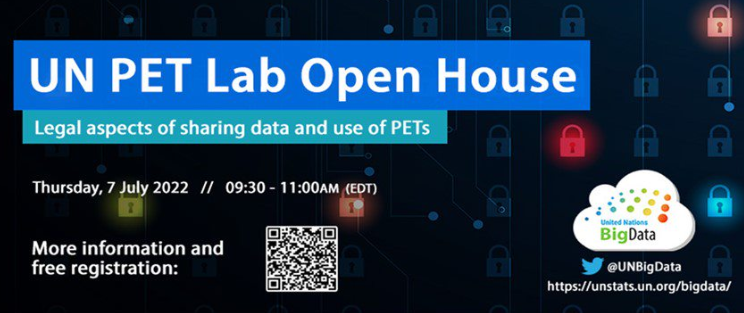
The 2030 Agenda for Sustainable Development calls for united efforts to ensure that everyone has equal rights and enjoys equal benefits from inclusive and sustainable growth. By committing to the 2030 Agenda, member states commit to working together for a prosperous and peaceful world where no one is left behind. To determine whether we have made sufficient progress towards these goals, we would need quality and inclusive data as well as sound statistical methods. Small Area Estimation (SAE) is an innovative school of methodologies designed to complement established tools in producing data for all. SAE can generate valid, survey-based estimates for areas of study with sample sizes too small to yield statistical significance. A variety of methods for SAE exists, and the field is ever-growing.
To synthesize information and offer users a dedicated resource for SAE methodologies, the United Nations Statistics Division, Inter-Agency and Expert Group on SDG Indicators, and Inter-Secretariat Working Group on Household Surveys have developed the SAE4SDG Toolkit. The Toolkit is a Wiki space that provides practitioners and technical staff within the National Statistical Systems the latest information on SAE methods for monitoring SDGs, processes for deriving estimates, and insights for transitioning from SAE experimentation to production. The SAE4SDG Toolkit is a contribution to a growing effort to address the challenges regarding the limited uses of SAE in official statistics despite the maturity of the school of methodologies.
For more information, please visit the UN Statistics SAE4SDG Toolkit Wiki space.
Please find more information at below link and feel free to share with your network.
https://inspira.un.org/psc/UNCAREERS/EMPLOYEE/HRMS/c/UN_CUSTOMIZATIONS.UN_JOB_DETAIL.GBL?Page=UN_JOB_DETAIL&Action=A&SiteId=1&JobOpeningId=184250&PostingSeq=1
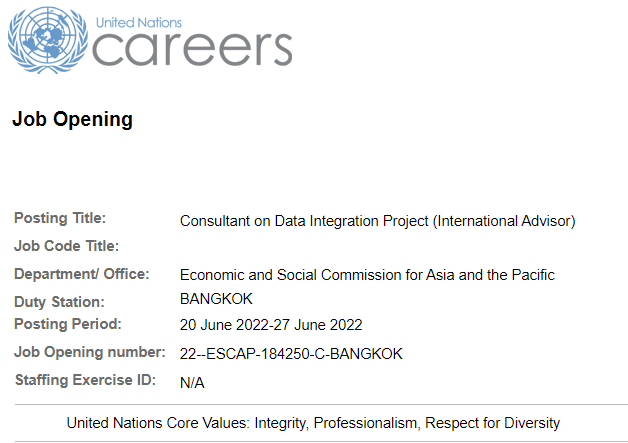
Monday, 20 June 2022, 12:00-13:30 hours, Bangkok Time (UTC+7)
Please register at this link and when it’s time, click here to join the meeting.
>>>>See other Asia-Pacific Stats Café Series
The Pacific Community's (SPC) Pacific Data Hub Community of Practice in collaboration with the United Nations Conference on Trade and Development (UNCTAD) invites you for a Pacific Talanoa* on the role of data in today’s digital economy.
The meeting will be organized virtually on Friday 17th June 2022 at 9:30 AM to 11:30 AM (Fiji time)
Click on the registration link to sign-up for the event.
Click here for more information
Note: The term ‘Talanoa’ is used in many parts of the Pacific to describe a process of inclusive and transparent dialogue. The Talanoa space is a place for sharing of ideas, knowledge and understanding.
The free online conference Using Big Data and Machine Learning for Land Cover and Land Use Mapping: Challenges to Mapping Accuracy, to be held next July 5, 6 and 7, at 11:00 to 13:00 h (GMT-3).
This event is part of the work plan of the Regional Hub of the United Nations Global Platform for Big Data in Brazil (https://hub.ibge.gov.br/) and is being organized by Brazilian Institute of Geography and Statistics – IBGE, National Institute for Space Research - INPE and the Information and Coordination Center of Ponto BR – nic.br.
Entries can be made through the link: https://forms.gle/cr6xofhXCpiodKyLA
Simultaneous Translation will be provided in English, Spanish and Portuguese.
For queries or need more information, please contact hubbrazil@ibge.gov.br.
Powered by a free Atlassian Confluence Community License granted to https://www.atlassian.com/software/views/community-license-request. Evaluate Confluence today.
- Kolekti ThemeBuilder Powered by Atlassian Confluence 8.5.5
- Kolekti ThemeBuilder printed.by.atlassian.confluence
- Report a bug
- Atlassian News